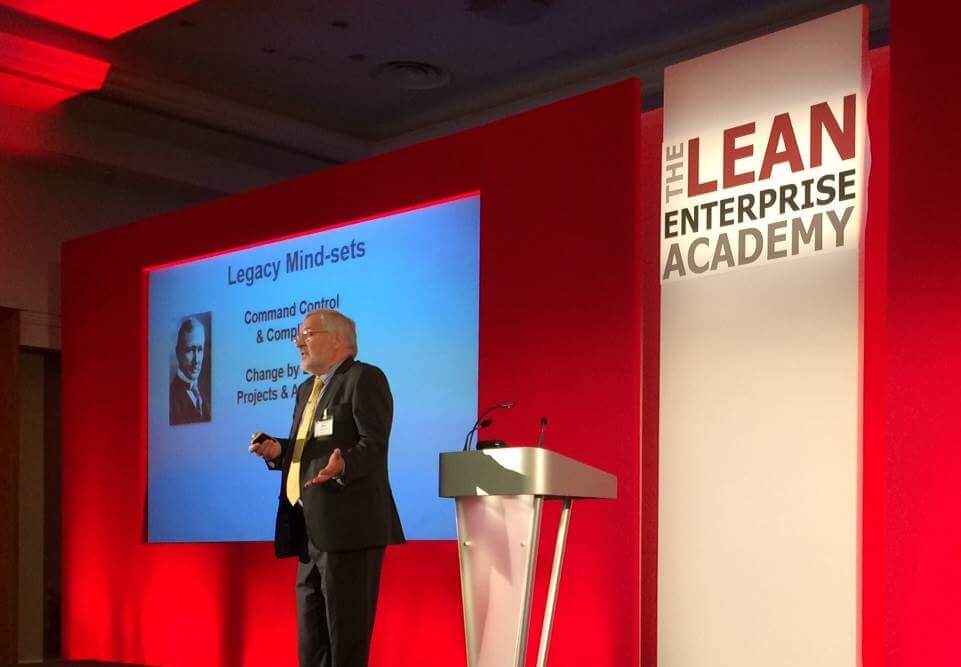Dan Jones – Beyond Legacy Assets and Mind-sets
Here we are at the LEA Summit 2014, with 200 Lean practitioners keen to discuss, think and learn. The gathering provides a useful space to step outside of day to-day tactical concerns and consider more strategic questions about Lean. And Dan Jones has posed a conundrum: how does Lean survive into the Digital Age?

The new Digital Age has bought about significant technological innovation, providing a myriad of opportunities for new products and services. It provides the means to gain clearer insights into customer experiences. Consumers, in turn, have become more knowledgeable and are keen to be involved in how products and services are developed. Technological starts-up provide a fertile testing ground for new ways of thinking about how organisations provide customer value. And the nature of work is changing, divisions between physical and knowledge work are becoming even more imperceptible. It may seem inconceivable that Lean, now an established philosophy, could become irrelevant. But Lean was borne out of the old world order – large manufacturing plants and warehouses, large hospitals and complex supply chains – and it has a proven track record at tackling the in-built levels of waste. Here, Taylorism is king with legacy management systems where leadership equates to command and control, manage by results and change is led by experts. There is still some way for Lean to go in addressing these old world problems. But the question is ‘Is Lean still relevant in this new age?’ And if so, how can it contribute?
Toyota, the template for Lean, is set to thrive into this new age. Their big vision – to deliver future mobility for their customers – is predicated on the merging of a deep technological capability with a clear purpose to deliver value for society as a whole. And they will achieve this through engaging the talents and passion of their people. From Toyota’s and other Lean organisation examples, Dan has postulated that there are three areas where Lean can make big contributions. Link to Toyota’s Global Vision
#1Changing management mental models
Even the new giants of the Digital Age – Google, Amazon, ebay – with the opportunity to reinvent business models, have created legacy management systems with the same old problems. The lesson of Lean Learning provides the means to radically change these embedded models. It teaches us that the management task is to find and frame the real problems that employees and customers face on a daily basis. To then lead by challenging, questioning and coaching employees to solve these problems in a structured and systematic way, every day. Learning and improvement through incremental steps, Kaizen rather than through big leaps, proves a powerful device still relevant in the new age.
#2 Organise and manage streams to deliver value
Old thinking frames work in terms of discrete large scale projects, a legacy of batch thinking and the mass production age. The new age demands a re-think, where change and technological development are seen as streams of products and processes delivering value to the customer. Rather than with batch implementation, streams and their processes can be broken down into smaller incremental steps, promoting rapid testing, learning and implementation. The challenge here for Lean is to think about how best to organise and lead people to support these streams.
#3 Engaging Users
There is a danger that constant leaps in innovation reinforce the tendency for organisations to design their offering around technological capability – selling to the customers what they can rather than what they need. In the new age, products and services will be framed as how they solve customers’ problems, thus balancing technological opportunities with purpose. Lean here can provide the means to help organisations think through the customers’ processes and support the integration of customers into the design process, translating experiences directly into features and services.
So Lean does have something to say in this new age. But, taking its own advice, it needs to learn, create new models and adapt to help organisations meet these challenges.